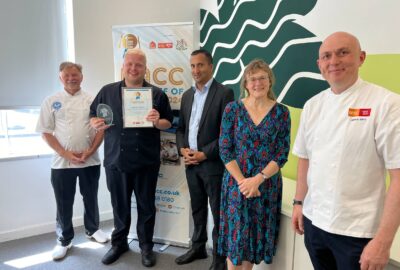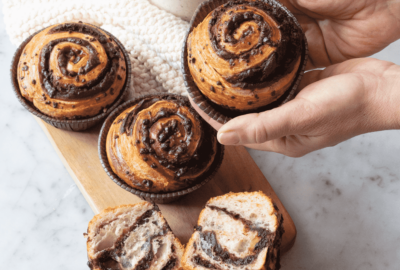With responsibility for the kitchens and cooking school at Hugh Fearnley-Whittingstall’s River Cottage, no one day is ever the same for Culinary Director Gelf Alderson. Working for one of the UK’s pioneers for seasonality and sustainability, we caught up with Gelf to discuss his route into the world of food, industry trends and the latest book in the River Cottage Great Series – Great Roasts.
How did your love of food develop?
We were always home from school before my parents got back and while we weren’t allowed to watch TV, we would always sneak in Ready Steady Cook before they got home. We loved it. It made food fun and interesting. I had worked as a pot wash but I actually dropped out of school so started an apprenticeship in a kitchen. I always loved food – the dexterity of it – and I loved the buzz and the comradery of the kitchen immediately. I played plenty of team sports and it felt very similar. Everyone pitching in and working together. I was lucky that I started where I did as it was a great learning experience. I learnt how to butcher animals, how kitchens were structured, what was important to success and the discipline.
Tell us about your current role?
I’m currently Culinary Director at River Cottage where I have worked for 11 years. I started as a senior sous chef, then head chef and then became executive chef across the River Cottage restaurants, which unfortunately had to close after the pandemic. My role offers real variety – overseeing the restaurant at the River Cottage farm, designing and producing the River Cottage products, helping with the running of our cookery classes and working on the books. Vegetables are obviously our passion and focus so it also involves keeping a close eye on the farm and what seasonal produce is coming from it.
What do you love about your job?
River Cottage has blazed a trail when it comes to veg, which is something we’re all very proud of. My role is incredibly diverse and offers plenty of variety. No day is ever the same, it’s an ultra-seasonal life whether it’s working with the latest, freshest veg to show its face or wild foraging. I realised I need to be around food, you can’t distance yourself
too much from it or you lose touch. Things move fast in the industry.
What is your latest book about?
The book highlights how a roast can be cooked in 1-2 trays and doesn’t have to be the messy, time laborious meal to cook. It’s also about getting people to look differently at roasting. They can be very diverse – roast fruit, roast breakfasts, roast snacks – so much can be done.
Can you share 3 tips to improve your roast?
- Turn the oven up – if it says 220, cook at 220. Don’t be scared. You need the
heat for a roast. Otherwise, the water released from the ingredients will create steam and you won’t get the crispness, the texture or the colour. - Get to know your oven – they’re all very different and some aren’t that precise. Get a temperature thermometer and check your oven. You may be surprised but being precise with you roasting temperature is key.
- Good solid roasting trays/tins. Make sure they’re thick bottomed – retains the heat, buy one and it will last 10 years – better finish and colour.
What do chefs and businesses need to do to survive and thrive in the next year?
I expect the number of times that people will eat out will be lower next year so businesses will have to react. Chefs are going to have to work hard to keep their offering interesting. Good food and good service still sells – people will always come back if you can provide this. It doesn’t have to mean Michelin and businesses don’t need massive teams. Don’t be scared to close a few nights, it’s far better for business having 3-4 busy days and nights than 7 half-busy days.
What can we expect next from River Cottage?
It’s exciting times as we look to further develop the restaurant on the River Cottage farm and cookery school. It’s about continuing to showcase provenance, seasonality and ethics around food. Educating people on veg, foraging, gut health and how what you eat can have a dramatic effect on your all-round health and the world.
What are your tips for waste reduction in the kitchen?
- Don’t have a big bin – our chefs each have a plastic tub for compostable waste and then one for other waste. It makes it easy to measure and keep a close eye
on what goes in the bin. - Keep a close eye on the fridge. Anything going slightly old – pickle and ferment – meats and fish can be cured
or frozen. - Take your team to an abattoir. It gives perspective and means chefs will look
at meat as an animal giving its life instead of a commodity. You will find chefs have
a new perspective when they work
with meats.
What Signature Dish would you like to share?
I’m going to share my rolled lamb breast with herbs, lemon and tomatoes recipe. Lamb breast is a part of the animal which has gone truly out of fashion and turning it into something wonderful is such a rewarding experience.



